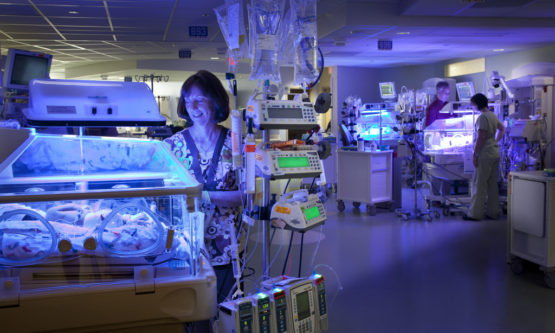For the first time, Zika has officially invaded Pinellas County. Gov. Rick Scott announced on Tuesday that out of the 29 locally acquired mosquito-borne cases that have occurred in Florida, one case has now appeared here.
Zika infections have been on the rise in various counties around Florida. Miami-Dade County leads the state with a staggering 160 cases, most of those located in the Wynwood area. Broward County has the second highest rate of Zika with 96 cases. Pinellas County’s total number of Zika incidents is 13, which places it as ninth highest in the state.

While anyone is susceptible to the virus, pregnant women are the among the most vulnerable. A pregnant woman who contracts Zika is at a much greater risk due to the possibility of the baby being born with microcephaly. Children born with microcephaly have underdeveloped brains and heads, which can lead to other neurological issues.
Dr. Juan Dumois is the director of pediatric infectious diseases at All Children’s Hospital. In an interview with The Crow’s Nest, Dumois outlined the risk for pregnant women.
“The biggest concern is, of course, for pregnant women and women looking to get pregnant,” said Dumois. “But this disease also affects people close to those women. The virus transmits through mosquito bites and sex, so the chance of spread is very local.”
Dumois recommended that pregnant women who suspect they have an infection should contact the Florida Department of Health, which offers free Zika testing.
“Don’t procrastinate contacting them,” said Dumois. “Testing for Zika within the first week has the best chance of getting information on the infection and what risk there is for the fetus.”
He also suggested pregnant women keep constant contact with their obstetrician.
There is no cure for the Zika virus, many of those infected do not show symptoms. Dumois said that the risk of infection is very low, but that students should not ignore precautions. Prevention revolves around avoiding mosquito bites.
“It’s a scary thought that a virus that could really be life-altering could be in your county and not just some disease you hear about in the country.”
Bug repellent recommended by the CDC is one of the easiest measures. Almost all repellents are safe for use, even for pregnant women, according to Dumois.
The USFSP Factor:
Lily Fath is an expecting mother. This year, Fath will not be attending her family’s annual camping trip because she is concerned about Zika.
The Zika virus is an international epidemic that has dominated news coverage for the past few months. Now, the virus has made its way into our backyard. Last Tuesday, Gov. Rick Scott announced the first case of a locally transmitted infection in Pinellas County.
“It’s a scary thought that a virus that could really be life-altering could be in your county and not just some disease you hear about in the country,” Fath said.
Fath, a sophomore criminology major at USF St. Petersburg, said that the news of Zika in Pinellas County placed the outbreak in perspective for her.
“My family called me and it really freaked me out,” said Fath. “It made it a real issue for me instead of just another one of the many precautions you have to take as a pregnant woman.”
Zika is primarily spread by the Aedes species of mosquitoes that have been infected. An uninfected mosquito can spread the virus from an infected human to an uninfected person. The virus is also sexually transmitted
Stay Zika Aware
College students are also advised to be Zika Aware, a campaign started for Florida’s public universities and colleges. The campaign is aimed towards teaching students about the virus, and to keep them up to date on any new findings.
The campaign, officially titled, “Zika Aware: Spill it, Spray it” is the brainchild of the State University System and the the Florida College System, and raises public awareness of ways to help prevent the virus. Zika Aware is also in partnership with the Department of Health’s Spill the Water campaign. The purpose of both movements is to help people stop the Zika virus from spreading further, offering tips such as getting rid of standing water where mosquitos can breed and grow.
“Currently the best prevention for Zika virus is to take precautions against mosquito bites.”
“The universities, colleges and Department of Health launched the campaign in response to a recent initiative from Governor Rick Scott,” wrote the State University System of Florida on their news blog. The presidents of the State University System and the Florida College System were informed of the virus’s spread, and educated on how to ensure students’ safety.
USFSP has even gotten in on the action. While as of Aug. 24, “no transmission of the Zika virus by local mosquitoes has been detected on any USF System campus,” the college is still taking precautionary measures, according to the USFSP website. USF as a whole is participating in the Zika Aware campaign, and also warns students of the possible symptoms of the virus on their site.
“Many people infected with Zika virus experience no symptoms,” wrote USF in an announcement, “but those who do most commonly experience fever, rash, pink eye, or joint pain. Currently the best prevention for Zika virus is to take precautions against mosquito bites. USF students are strongly encouraged to follow CDC guidelines to reduce exposure to mosquito bites.”
For more information on health issues in general, USFSP students can make a visit to the USFSP Wellness Center in the Student Life Center 2200, or call (727) 873-4422.
The Latest Science Out There
The Florida Department of Health has not disclosed the results of their survey after a locally transmitted case of Zika was found in Pinellas County. They have also not released the exact location of the infection, or if the infection has spread any further.
Congressman David Jolly (R), told Fox 13 that he believes that the public needs more information, including a general idea of the geographical area of the Pinellas County transmission case.
According to the Centers for Disease Control and Prevention, infected mosquitoes of the Aedes spread Zika when they bite humans. They are mostly active during the day.
Symptoms of the Zika virus include fever, headaches, joint pain, rash, conjunctivitis (pink eye) and muscle pain.
Pinellas County Mosquito Control offers free services for clearing away mosquitoes from heavily infested areas. Call their hotline anytime at (855) 622-6735.
Researchers at the USF medical school have been sharing research on the Zika virus. The university division is working closely with the Gorgas Memorial Institute in Panama, where the World Health Organization has recorded up to 800 suspected cases. The partnership is planning a two-year study on the children of infected women.
However, the medical school is struggling to receive funding quickly. According to the Tampa Bay Times it will take up to nine months to approve additional funding from the National Institute of Health. The USF medical division hopes to make instrumental advances towards a vaccine.
Prevention
Currently, there is no cure or medicinal treatment for the Zika virus. Dumois said that prevention is the most crucial element of the fight against infection.
“A pregnant woman cannot screen everyone she comes in contact with, so it’s important to avoid the bite altogether,” said Dumois.
The CDC recommends that you wear long-sleeved shirts and pants, get rid of standing water that may attract mosquitoes, and use an Environmental Protection Agency-approved bug repellant.
Mosquitoes only need between one-quarter and one-half of an inch of water to breed. To prevent a mosquito infestation, make sure to clear out any containers of water.
Be wary of bogus mosquito repellant, says Pinellas County Mosquito Control. Smartphone apps, ultrasonic devices, and citronella candles are not effective means of preventing mosquitoes.
Look for bug repellant that contains DEET, picaridin, oil of lemon eucalyptus, para-methane-diol, or IR3535 as an active ingredient.
These chemicals are EPA approved, even for pregnant and nursing women, according to the CDC website.
Since the Zika virus can also be transmitted sexually, the CDC recommends using a physical barrier prophylactic, like condoms, to decrease the likelihood of transmission.
How to make your own Zika kit:
The CDC recommends a Zika kit to anyone who lives in an area where there is a high concern for Zika and the spread of it. These can be made at home with just a few supplies.
Standing water treatment tabs: You can drop these tablets into bodies of standing water near your home in order to get rid of mosquito larvae that are growing there.
Bed net: Due to the fact that mosquitoes can bite at any time of the day or night, bed nets are suggested so that you can stay protected while resting.
Insect Repellent: Use an EPA-approved insect repellent. If you also happen to be wearing sunscreen, put that on first and apply the repellent afterward.
Permethrin Spray: This is an insecticide that is only to be used on clothing and gear, do not put this on your skin.
Condoms: Zika is not a sexually transmitted disease, but you can get it from a partner through anal, oral, or vaginal sex.
The Fight for Funding
According to WUSF News, Gov. Rick Scott is in talks to travel to Washington, D.C. on Sept. 6 to meet with Congress and lobby for a funding bill that could help combat the Zika virus. Congress has spent seven weeks in recess, but soon, Scott says that he will “meet with members of Congress on the day they return to work to make sure they immediately get something done on this urgent issue.”
“[Ever] since Congress decided to go on a seven-week vacation, the state of Florida has been hard at work combating the Zika virus,” said Scott.
But something else that has been hard at work while the members of Congress have been away? Yep, you guessed it: the Zika virus. Scott says that 43 locally acquired Zika cases have been identified in four different Florida counties since Congress’ hiatus. According to the Florida Department of Health, the virus is being actively transmitted in Miami-Dade County. Investigations are still being made into the Pinellas and Palm Beach county cases.
Wynwood
If you’re curious how the Zika virus found itself in South Florida, you may have a tiny town called Wynwood to thank. According to a Q&A by the Tampa Bay Times, most of the local cases have stemmed from people getting bitten by mosquitoes infected by the Zika virus in Wynwood, Florida.
Understandably, the CDC has officially advised pregnant woman to stay away from the 1-square-mile Wynwood. This is the first time the CDC has ever warned people to avoid traveling to any area in the continental United States, according to the Tampa Bay Times.
In an Aug. 22 report in the Miami Herald, State Surgeon General Celeste Philip said that so far, Wynwood has gone several weeks without seeing any new Zika cases. Gov. Rick Scott also said that he plans to send millions of dollars in funds to help Miami-Dade County offset the costs of the mosquito control efforts in response to the Zika outbreak.
If you have questions or concerns contact:
Zika Hotline (855)-622-6735
Florida Department of Health (850)-245-4444
Pinellas County Health Department (727)-824-6900
Pinellas County Mosquito Control (727)-464-7503
All Children’s Hospital (727)-898-7451
Information from the CDC, Florida Department of Health, New York TImes, Tampa Bay Times, Bay News 9 and WUSF were used in this article.
© Photo Courtesy of Johns Hopkin’s All Children’s Hospital



